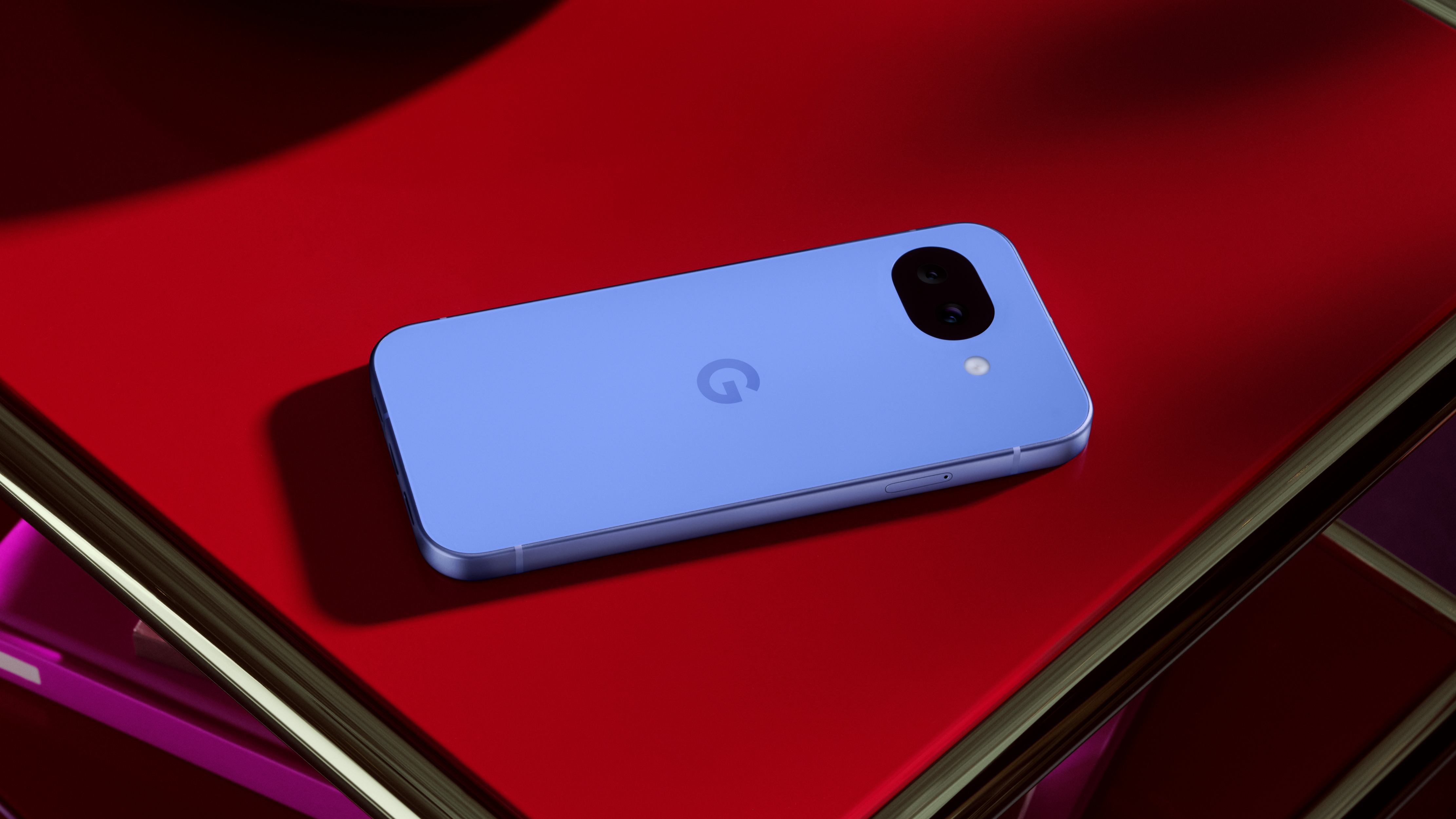Amazfit GTS 2 vs. GTS 2 Mini: Which should you buy?
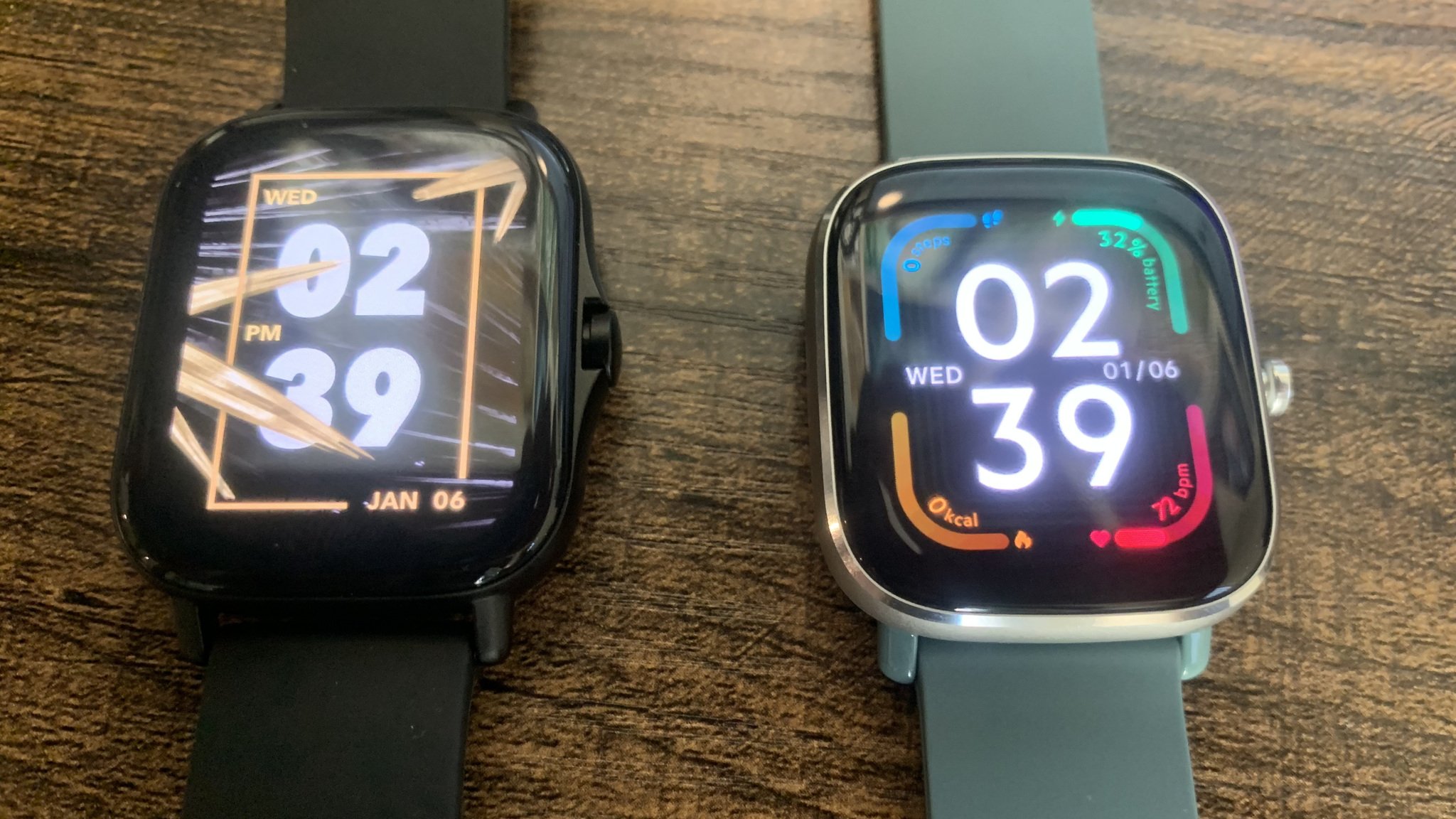
Get the latest news from Android Central, your trusted companion in the world of Android
You are now subscribed
Your newsletter sign-up was successful
Amazfit GTS 2 Mini
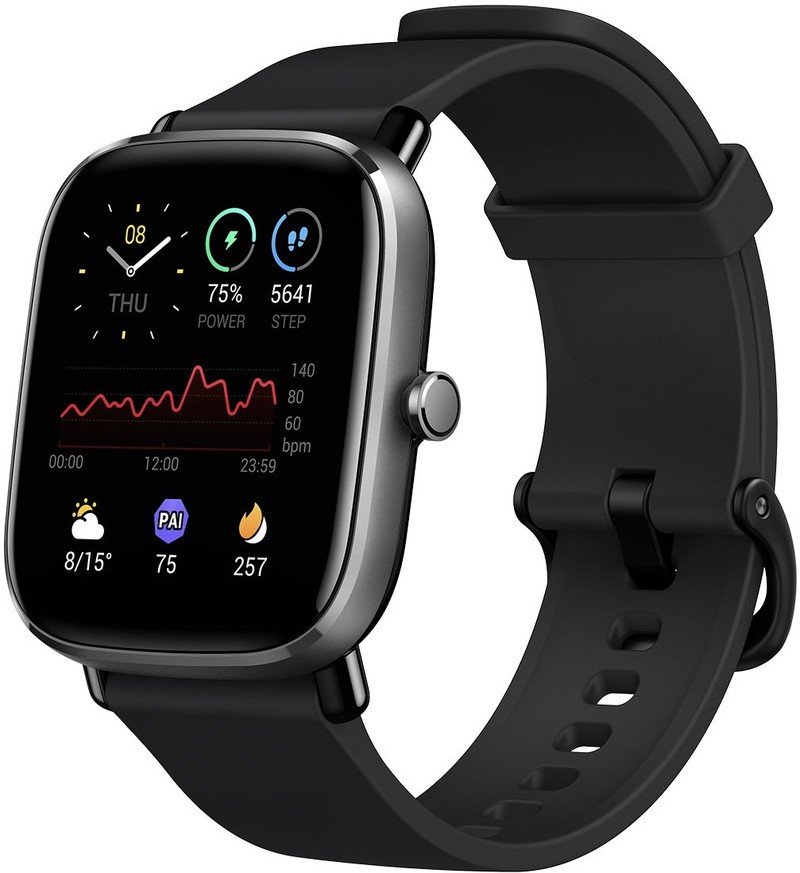
Anyone looking for a cheap fitness tracker that will also look classy on your wrist outside of workouts should strongly consider the Amazfit GTS 2 Mini. It'll provide you with up-to-date health data and has over 70 sports modes, and still out thanks to its bright and colorful display.
Amazfit GTS 2 Mini
14-day battery life
Amazfit GTS 2
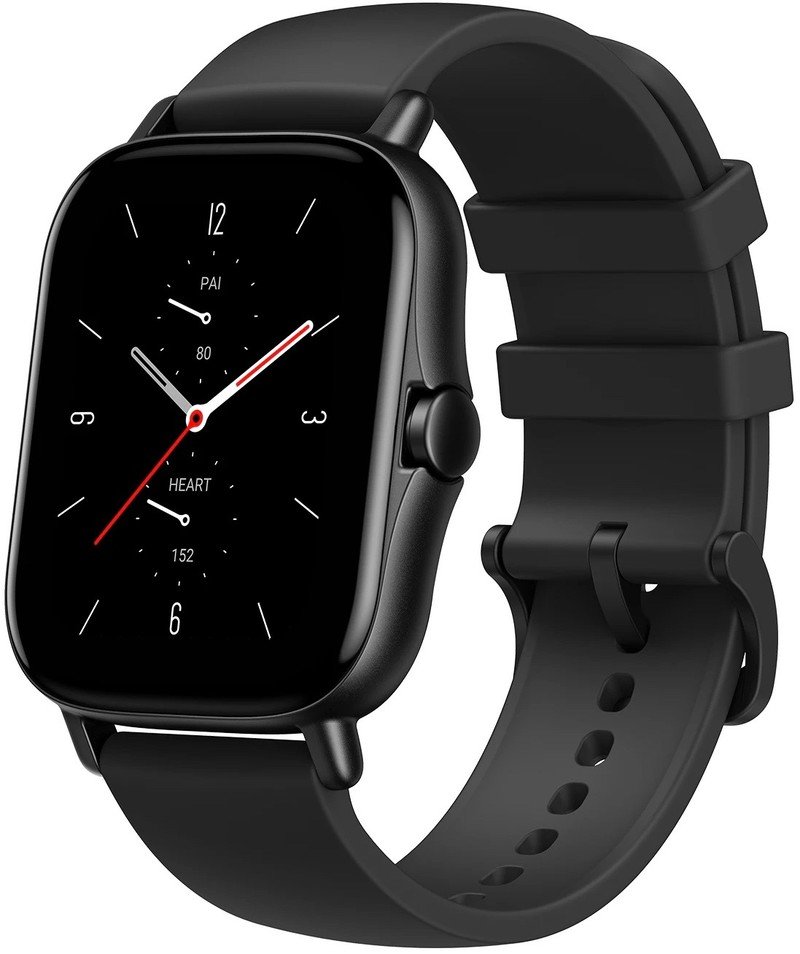
The GTS 2 is still relatively new, but it has plenty of upsides over its Mini counterpart. It lets you store music, navigate to apps via voice commands, answer phone calls, and its display packs in more pixels for a better user experience. But you'll pay nearly double the price, and it has no fitness standout features that the Mini lacks.
Amazfit GTS 2
Music storage and voice commands
After testing out both of these dainty fitness smartwatches, we're found all the major and minor benefits of choosing the Amazfit GTS 2 vs. GTS 2 Mini. The new miniature watch has all of the same health tracking and built-in GPS tech — and even some new apps — as its predecessor for a much better price. That being said, the GTS 2 does come with features like music storage and an offline voice assistant that will make some athletes want to shell out the extra cash. Below, you'll find everything you need to know before buying either GTS 2 smartwatch.
Amazfit GTS 2 vs GTS 2 Mini Design differences
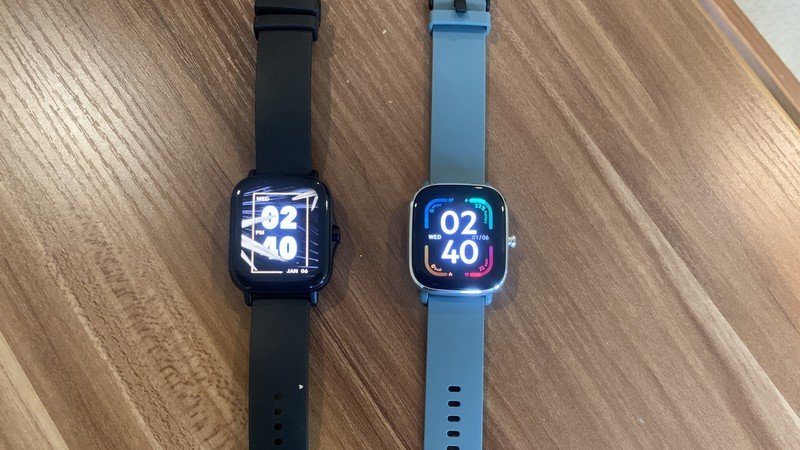
Adding "Mini" to the new GTS 2 is a bit of an exaggeration because these two watches are pretty similar in size. The GTS 2 display is only 0.1 inches larger than the GTS 2 Mini's, adding an extra 5.2 grams (or 0.18 ounces) of weight. You can barely tell the difference when wearing one watch on either wrist, and it may have been confirmation bias on my part. I even asked my partner if one felt heavier, and she said no until I told her which one was supposed to weigh more.
The GTS 2 Mini isn't actually that much smaller or lighter than the GTS 2. The price is certainly smaller, though!
The same thing applies to the displays, which don't look as different as Huami's marketing would make you believe. On the GTS 2, the display is made of 3D curved glass designed to be "borderless," while the GTS 2 Mini has a "2.5D curved screen" with the same "borderless" claim. Of the two, the border of my Mini was more visible but only because of its two-tone design compared to my all-black GTS 2 review unit. Apart from being slightly larger, the GTS 2 does have somewhat rounder edges than the Mini, which looks a bit flatter by comparison. Once you stop squinting, they look very similar.
Both GTS 2 watches are made of the same materials, with an aluminum alloy body, plastic bottom, and silicon band. The only noticeable difference is that the GTS 2 has two watch band loops while the GTS 2 Mini has one. I preferred fitting the Mini to my wrist since it was easier to keep one loop in place while slotting the band through it, but others will prefer two loops.
Amazfit GTS 2 vs GTS 2 Mini Dazzling displays
Looking for a bright and vibrant AMOLED screen on your cheap fitness smartwatch? An Amazfit GTS 2 goes toe-to-toe against the best fitness smartwatches in visual quality, while the GTS 2 Mini provides a slight downgrade in pixel quality but easily outperforms other cheap Android smartwatches in the sub-$100 range.
Get the latest news from Android Central, your trusted companion in the world of Android
Both GTS 2 smartwatches hit 450 nits of brightness and 100% NTSC high color saturation. As I discussed in my GTS 2 review, the adaptive brightness works very well, and I had no trouble seeing the display or bright colors even in direct sunlight. That also applies to the GTS 2 Mini, for which I'm currently writing the review.
The GTS 2 has a noticeably better display, but the GTS 2 Mini compares favorably against other watches in its price range.
Unsurprisingly, there is a noticeable dip in quality with the cheaper GTS 2 Mini, which has fewer pixels per inch (ppi). The GTS 2 has a 348x442 resolution, translating into a 341 ppi, while the GTS 2 Mini only hits 354x306 for a 301 ppi. Compared to other popular smartwatches, the GTS 2 falls a bit short of the Galaxy Watch Active 2 (364 ppi) but crushes the Garmin Vivoactive 4 (283 ppi), while the GTS 2 Mini just ekes out a win over the Fitbit Versa 3's 300 ppi AMOLED.
Is this ppi difference enough to justify paying nearly double the price for the GTS 2? The GTS 2 Mini makes its text and graphics slightly larger to compensate for the missing pixels, while the GTS 2 has a more compact UI. More importantly, the GTS 2 menus are silky smooth when you scroll up and down or navigate between them, while there's a slight but noticeable stutter when swiping between menus on the Mini.
If you're buying this to look at the time, track exercise, and send health data to your phone, the Mini looks pretty enough to satisfy most people. The visual difference is only important to people who think they'll regularly use the GTS 2's watch apps on a daily basis.
Amazfit GTS 2 vs GTS 2 Mini Battery life
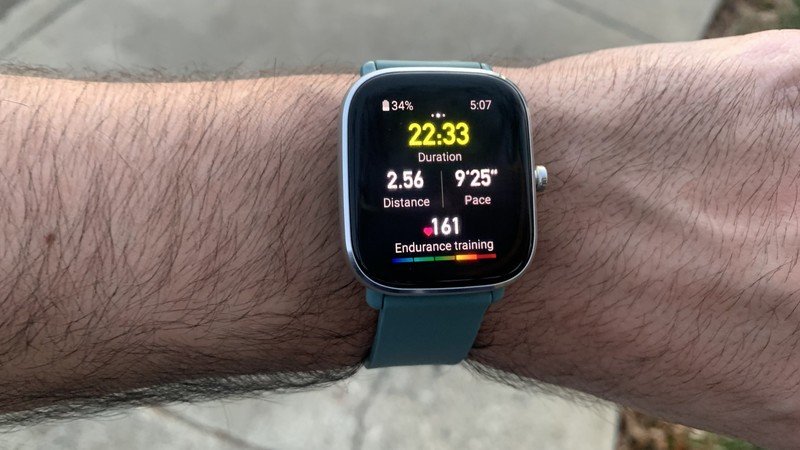
Both of these smartwatches have a proprietary "Huami BioTracker 2 PPG" that measures heart rates and blood oxygen saturation (SpO2), plus built-in GPS for accurate workout results. The more often you use these features, the more your battery life will take a hit. Thankfully, both GTS 2 watches are built to last a long time per charges even with heavy use. Your particular experience will vary based on how often you work out and the frequency of your health measurements.
The GTS 2 lineup is designed for people who hate having to charge their devices — especially the GTS 2 Mini.
The GTS 2 has an average of 7 days with basic usage, with the potential for up to three weeks in battery saver mode — though only 3.5 days with "heavy usage," according to Huami. For even better battery life, the GTS 2 Mini averages 14 days as a baseline, and lasts a full week with heavy use settings activated like heart rate measurements every minute, or sleep and stress tracking.
In my GTS 2 review, I found that its battery life lived up to its basic use estimate, and so far the Mini appears to have similar longevity.
Most fitness smartwatches last somewhere between 3–7 days, putting the GTS 2 at the higher end of the spectrum. For two weeks of battery life, you usually have to invest in a fitness band with a narrow, low-res display, making the GTS 2 Mini an intriguing option for athletes who want the best of both worlds.
Amazfit GTS 2 vs GTS 2 Mini Similar specs, with some key differences
When comparing the Amazfit GTS 2 versus the GTS 2 Mini, I expected the design, display, and battery differences, but for the two watches to be otherwise close in specifications and features to one another. Or, if there were any differences, for the GTS 2 to have all the extra features. However, exploring their respective features led to some surprises.
| Header Cell - Column 0 | Amazfit GTS 2 | Amazfit GTS 2 Mini |
|---|---|---|
| Price | $180 | $100 |
| Band colors | Midnight Black, Urban Grey, Desert Gold | Midnight Black, Flamingo Pink, Sage Green |
| Display | 1.65" AMOLED display with 3D curved glass 450 nits of brightness 341 ppi | 1.55" AMOLED display with 2.5D curved glass 450 nits of brightness 301 ppi |
| Dimensions | 42.8mm x 35.6mm x 9.7mm | 40.5mm x 35.8mm x 8.95 mm |
| Weight (without strap) | 24.7g (0.87oz) | 19.5g (0.69oz) |
| Materials | Aluminum alloy body with plastic bottom | Aluminum alloy body with plastic bottom |
| Battery | 246 mAh 7 days typical battery life 3.5 days heavy usage battery life 2 hour charging time | 220mAh 14 days typical battery life 7 days heavy usage battery life 2 hour charging time |
| Connectivity | Bluetooth 5.0; WLAN 2.4GHz | Bluetooth 5.0 BLE |
| Sensors | Air pressure sensor, Acceleration sensor, Gyroscope sensor, Geomagnetic sensor, Ambient light sensor | Acceleration sensor, Gyroscope sensor, Geomagnetic sensor, Ambient light sensor |
| GPS + GLONASS | Yes | Yes |
| Music storage | 3GB (approximately 300-600 MP3 songs) | None |
| Answer phone calls on watch? | Yes | No, can only send calls to voicemail |
| Voice commands | Yes | No |
| App list | Activity goals, alarm, barometric altometer, compass, countdown (timer), find phone, heart rate, music, PAI, sleep, SpO2, stopwatch, stress, weather, workout, workout history | Activity goals, alarm, breathing, camera remote, compass, countdown (timer), cycle tracking, find phone, heart rate, PAI, Pomodoro tracker, sleep, SpO2, stopwatch, stress, weather, workout, workout history |
| Heart rate monitoring | Yes, will measure automatically up to once per minute | Yes, will measure automatically up to once per minute |
| SpO2 measurement | Yes | Yes |
| Sleep & stress monitoring | Yes | Yes |
| Waterproofing | 5 ATM | 5 ATM |
The GTS 2 does have two key features that its Mini sibling lacks: a built-in mic, speakers, and music storage. With the first feature, you can answer calls on your watch after syncing your smartphone via Bluetooth. You can also twist your wrist to activate a voice assistant that lets you jump to another app ("open weather") or start a workout without having to navigate via the touchscreen.
These highly convenient features are perhaps the strongest case for paying extra for the GTS 2, especially the voice assistant. I found both features worked well without any hiccups, and I missed the option to answer calls easily while testing the Mini.
Only the GTS 2 supports music storage and voice commands, but only the latter particularly bothered me.
As for the second feature, the GTS 2 lets you store a few hundred songs, then listen to them via the speaker or wireless headphones. The GTS 2 Mini has a Music app, but only to let you pause or skip songs on your connected smartphone. Many athletes bring their phones on workouts anyways, and don't bother with watch storage, making this less of an issue — especially considering the GTS 2 only supports storage of music files you own and not music apps like Spotify.
What surprised me was that the GTS 2 Mini has several new tracking apps that the GTS 2 lacks. The Mini lets you track period cycles and productivity using a Pomodoro clock, and can even measure your breathing. It also lets you connect to your smartphone camera and take a picture remotely.
While the GTS 2 can't do any of these actions, none of them are particularly vital for a fitness watch. Plus, it has one more important feature the Mini is missing: a barometric altometer. If you live at a high altitude or want more accurate health readings while traveling, it's a useful addition.
Amazfit GTS 2 vs GTS 2 Mini Which should you buy?
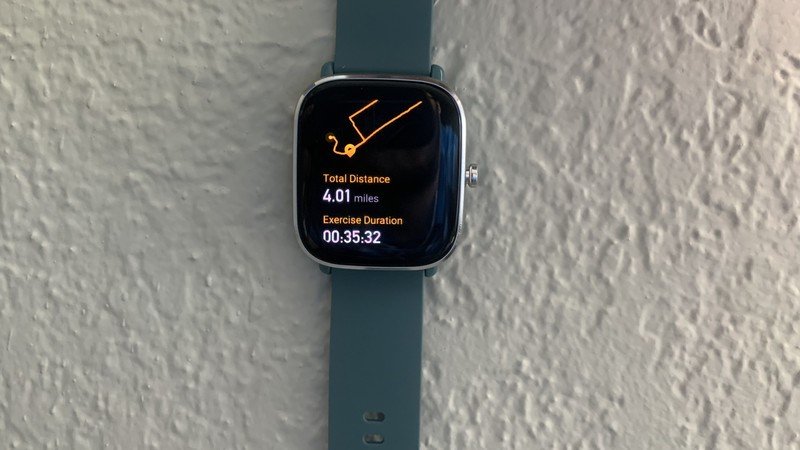
Having been given both watches for free for review, it'd be easy for me to recommend the GTS 2. I preferred its silky-smooth, pixel-heavy menus and liked the option to answer phone calls if I can't find my phone. Both watches' menus can be a bit dense and tricky to navigate, so I like being able to twist my wrist and jump straight to the heart rate app without having to remember which way to swipe to find it.
That being said, I think the GTS 2 Mini is what more Amazfit smartwatch shoppers are looking for: an affordable, pretty watch that mainly needs to track GPS and health data. The GTS 2 is priced closer to a Galaxy Watch Active 2 or Apple Watch Series 3. Both of these have similar health tracking, music storage, voice assistant support, and can answer phone calls, while also featuring (in my mind) much better first- and third-party software than Huami offers with its apps.
Considering that the GTS 2 Mini has the same health sensors and sports apps as the GTS 2, I'd recommend most shoppers save some money and stick with the cheaper smartwatch. Either that, or check out some of the best fitness trackers or best Android smartwatches and see how the GTS 2 lineup stacks up against the competition.

Cheap GPS, SpO2 and sleep tracking
This cheap fitness smartwatch will feel light and comfortable on your wrist during workouts, with a bright display that should stay visible in direct sunlight or underwater. If you don't need music storage or voice commands, this is the fitness tracker for you.

Smarter tech and a pixel-rich display
The GTS 2 gives you quality-of-life features that elevates it from a fitness tracker with a pretty screen to an actual smartwatch. If you want to be able to start a workout with a voice command, answer phone calls or leave your phone behind but still listen to a running playlist, pick this watch.

Michael is Android Central's resident expert on wearables and fitness. Before joining Android Central, he freelanced for years at Techradar, Wareable, Windows Central, and Digital Trends. Channeling his love of running, he established himself as an expert on fitness watches, testing and reviewing models from Garmin, Fitbit, Samsung, Apple, COROS, Polar, Amazfit, Suunto, and more.
